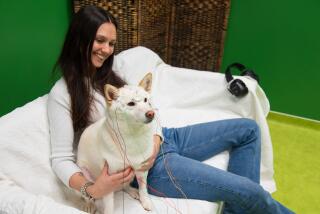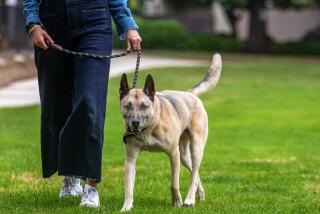A Bigger Social Circle Can Be a Pet Project
Ever since my kid got a dog, my social horizons have broadened. Postal workers have forged contacts with me, to tell me they couldn’t deliver my mail. Neighbors engage in chats over the hedge (“Boy, she was barking last night!”). And I am well-known at the vet’s office, where we’ve engaged in stimulating discussions about ear mange.
Of course, many of us have heard that having pets is supposed to lower stress and make us healthier. Forging social contacts through one’s dog could be one reason why. Recently, some British psychologists tested this in several studies. In one, a student dutifully counted how many times strangers engaged him in chitchat when he was with a dog (termed the “dog condition”) or without a dog (the “no dog condition”).
The results were pretty striking, report June McNicholas (a dog lover) and coauthor Glyn Collis (a cat man; he’s got seven) in the British Journal of Psychology. The presence of a dog led to many more chats with passersby. It didn’t matter much if the dog was dressed smartly in a matching collar and leash, or led by a frayed bit of rope tied to a macho studded collar (a condition termed “rough dog”). Nor was the man’s appearance very important.
“We asked: Does this depend on having a very nice, neatly dressed approachable person?” says Collis. “So we dressed the handler extremely scruffily--dirty T-shirt, torn jeans and big hobnailed boots.” The man was still approached, Collis says, almost as often as when he was wearing neat casual clothes. (So I see no reason to give up my hobnailed boots yet.)
But whether such friendly interactions have anything to do with the health and social life of pet owners is another matter, says Collis: Few of these encounters developed further than casual “hellos” in the street.
I Remember It Well, at Least I Think I Do
My memory is lousy, but at least I know what I was doing when certain historical events took place. The death of Princess Diana, for instance: I was drinking a beer in a restaurant.
Or was I? Might I, in fact, have been at home putting the finishing touches to my needlepoint cushion cover project? According to scientists at UC San Diego and the Veterans Affairs Medical Center in San Diego, maybe so. Writing in the journal Psychological Science, they report finding big memory errors in students’ recollections of a major news event--the O.J. Simpson murder trial verdict.
The study went like this. Three days after the verdict, students in the San Diego scientists’ class filled out a questionnaire detailing their whereabouts and feelings at the time they heard the news. Fifteen or 32 months later, the same questions were posed again.
This time, the answers differed significantly. In the 15-month group, 11% of the answers contained major inaccuracies; in the 32-month group, more than 40% of the stories had major distortions. Three days after the verdict, for instance, one student recalled watching the news come down in a noisy college lounge. Thirty-two months later, he was convinced he was at home in his living room with his father and sister.
In fact, at 32 months, less than one-third of the stories were highly accurate. At the same time, however, people were much more confident about their memories and gave much more detailed answers. Are our brains pathetic or what?
The San Diego folks don’t put it quite that way. They do say, however, that while it may seem like these “flashbulb” memories (of big, surprising historical events) are never to be forgotten, they do sometimes erode as easily as more mundane memories. The same kind of thing’s been found for events like the Challenger space shuttle disaster, the Loma Prieta earthquake and the resignation of British prime minister Margaret Thatcher (and, speaking as a Brit, if I wasn’t drinking a beer when I heard about that one, I’m sure I was shortly thereafter).






